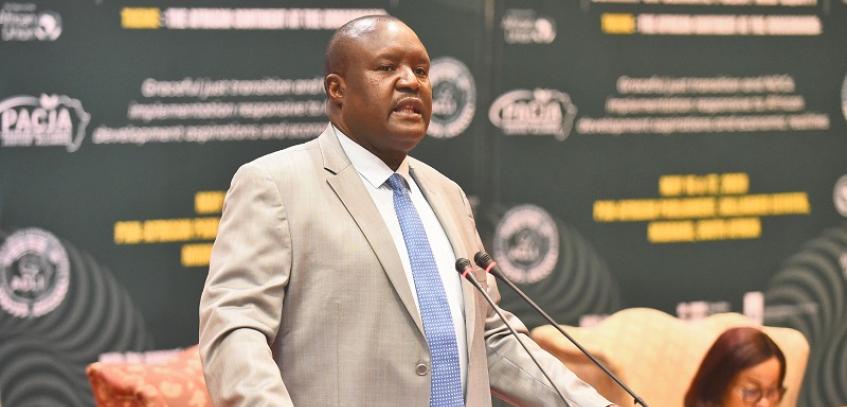The President of the Pan-African Parliament, H.E. Chief Fortune Charumbira has called for a “clear institutional arrangement force” that will bring the African citizenry together as the continent seeks progressive solutions on climate change affairs. He was speaking at the ongoing Pan-African Parliament’s Summit on Climate Policy and Equity held under the theme: “The Continent at the Crossroads; Graceful just transition and NDCs implementation responsive to African development aspirations and economic realities”.
This is the 3rd Pan-African Parliamentarians Summit on Climate Policy and Equity. The Summit seeks to galvanise a critical mass of stakeholders capable of catalysing broad support for pro-poor, just, equitable, locally led, and science-based decisions in NDC implementation and overall climate action. “We establish an African Climate Force if we are to achieve our goals on climate change matters,” said H.E. Charumbira.
“This force must constitute of African Union, Parliamentarians, civil society and other like-minded stakeholders operating across our continent. Our force must take a new direction implementing resolutions; we need to be more practical. It is important that we abandon the old ways of doing things where we just congregate then disintegrate after conferences.
“Our force will only succeed when there is proper leadership. The structure we will agree on must have proper leadership selected amongst ourselves. With proper leadership we will triumph,” he said encouraging participants to avoid repeating the same practices that have never produced needed results in the past.
H.E. Chief Charumbira further emphasised the need to do away with the practice of treating Climate Change matters as an elites affairs only, suggesting inclusion of African people at all levels.
Addressing the participants, PAP’s Committee on Agriculture, Natural Resources and Environment, Chairperson, Hon. Senator Didier Molisho Sadi, mentioned that as representatives of the people, parliamentarians have a crucial role to play in advancing climate action and ensuring that it is fair, equitable, just for and inclusive, without leaving anyone behind. He added that this is particularly made urgent with the increasing demand for locally-led adaptation actions, which are paramount in the implementation of the Paris Agreement and its Nationally Determined Contributions (NDCs).
Hon. Sadi also underlined that climate change furthermore presents an opportunity to rethink and redesign continental’s agricultural systems, health and economic and practices. “By adopting more sustainable and resilient methods, we can reduce greenhouse gas emissions, enhance soil health, and improve water management. Moreover, by harnessing the potential of innovation and cooperation, we can develop and share solutions that benefit farmers, consumers, and the environment.
“This Summit presents us with a lifetime opportunity to explore the best ways of dealing with these challenges, but also taking advantage of the opportunities they present,” he added suggesting an urgent need to strengthen strong collaboration with other non-state Actors such as civil society, private sector, academia and media to raise awareness and mobilize support for climate action, illustrated by this Summit which is hosted jointly between PACJA and PAP.
In the meantime, H.E. Josefa Sacko, Commissioner for Agriculture, Rural Development, Blue Economy, and Sustainable Environment (ARBE) of the African Union Commission has guaranteed to work with the PAP as she underscored the vital role the continental parliament should play.
“African Parliamentarians have a great role to play especially as it relates to formulation and speedy passage of relevant climate change policies and climate bills at their various National Parliaments and ensuring such instruments are well implemented,” she said while reading a statement on behalf of H.E Moussa Faki Mahamat, Chairperson of African Union Commission.
She also added that civil society organisations play critical roles in holding governments to accounts and supporting the implementation of climate change adaptation and mitigation activities as well as policy instruments at communities, sub-national and national levels.
H.E. Sacko further underlined that Climate change has become an existential threat to Africa. “While Africa have contributed the least to the cause of climate change, accounting for less than 4% of global Greenhouse Gas (GHG) emission, the continent bears the heaviest burden, partly as a result of having the least capacity to adapt. We are being punished for the sins of others.”
Dr. Mithika Mwenda, Executive Director, Pan Africa Climate Justice Alliance (PACJA) and the Co-host of this Summit has vowed that they will not stop reminding the World that Africa is the most vulnerable region to climate change, despite contributing the least to its causes. “Indeed, the impacts of climate change as so vivid that we no longer need a scientist to warn us how things have changed - more frequent and intense droughts, floods, heat waves, storms, and other extreme weather events that threaten our food security, water availability, health, infrastructure, biodiversity, and peace.
“We are also facing the loss and damage of our cultural and natural heritage, such as the glaciers of Mount Kilimanjaro and Mt. Kenya, and the coral reefs of the Indian Ocean. These impacts are not only undermining our efforts to achieve sustainable development and eradicate poverty, but also violating our human rights and dignity,” he said.
Dr. Mwenda further underscored that he is acutely aware of the challenges and opportunities that climate change poses for the continent and its people. “Food security, migration, conflict and poverty are all interlinked issues that are worsened by climate change. Climate change impacts the availability, access, utilisation and stability of food systems, leading to hunger and malnutrition. It also displaces millions of people who face increased risks of exploitation, discrimination and violence. Furthermore, it exacerbates existing inequalities and conflicts by creating or aggravating resource scarcities, grievances and instability,” he added.
Scheduled to end tomorrow, the Summit is held at the sidelines of the Second Session of the PAP’s sixth parliament which is currently underway in Midrand, South Africa, held under the 2023 AU theme, “Accelerating the implementation of the African Continental Free Trade Area (AfCFTA)”.








